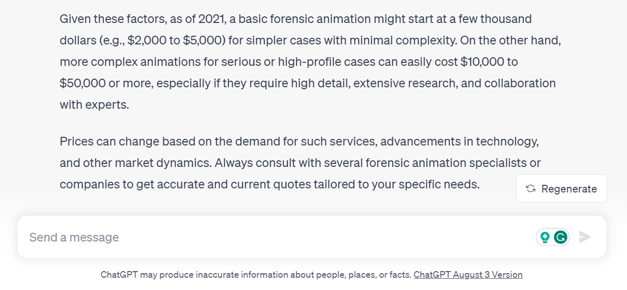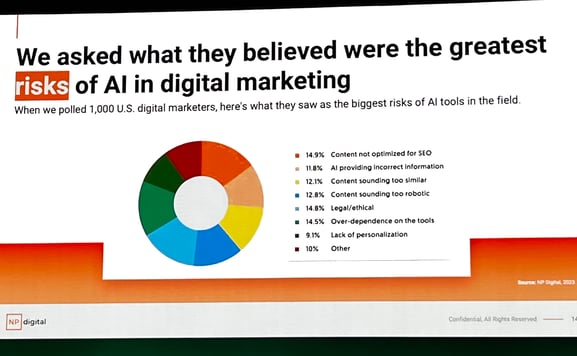- marketing strategy
- Artificial intelligence (AI)
- September 10, 2023
How AI is Accelerating B2B Transformation: Lessons from Inbound 2023

Aaron Marks

If you missed this year's INBOUND 2023 conference, you wouldn't be surprised to hear about today's hot topic of artificial intelligence (AI). Of course, there were lots of hot opinions about AI. Some are more valuable, while others are deliberately paradoxical.
However, if you dig a little deeper into the layers, the real point I got from INBOUND was not about AI itself, but about changes born from AI. In particular, the keynote address by HubSpot CEO Yamini Langan was most impressive to me. As Langan pointed out, the past nine months alone have seen more technological innovation than some sectors have done in almost a decade!
What's the point of her story? We are now moving into the information age, and the information age has almost passed. And for B2B companies, this is a huge risk, and there are plenty of opportunities to reap rewards.
Industries such as IT and manufacturing are the ones that are the slowest to adapt to changes in sales and marketing. Despite Forrester and other experts sounding the alarm that B2B's doom is imminent, companies have managed to survive and even prosper despite doing much the same things as before.
However, in the midst of the most rapid disruption to date thanks to AI, it is a new challenge for companies to adapt and evolve. In this article, we'll look at the key takeaways from inbound 2023 and how that will impact the business.
AI is disrupting everything and driving change faster than ever before.
AI has had predictive capabilities for years, but the advent of generative AI is bringing about a paradigm shift. This technology isn't just supportive; it's also actively working to create new content, provide insights, and even code software. As a result, it has become a broader strategic need for enterprises not only to “keep up” with AI, but also to anticipate and continue to understand what it means.
As Langan pointed out, AI has two meanings: speed and scale. If AI has been written off until now because “there is no impact on the industry,” you should be careful. AI isn't just impacting specific industries; it's not just changing anything. It's causing chaos everywhere and everything.
What is the essential transformation for B2B companies
Traditionally, many B2B companies have been able to “shrug” the changes, at least for a while. Therefore, even today, B2B companies can be found, such as in the IT industry and manufacturing industry, with websites that only provide simple information. Strong brand reputation, competent sales teams, or numerous customer referrals have enabled many companies to avoid (at least in part) how purchasing behavior has changed over the past decade.
However, this change from the information age to the information age is by no means a subtle change. It fundamentally overhauled how companies interact with customers. Generative AI technology doesn't just predict; it also positively affects buyer behavior. As a result, companies must review their strategies so that buyers are not only well-informed, but also extremely agile and adaptable.
“Businesses that focus on connecting with customers have grown 5 times more than the average company.”
- Yamini Langan, CEO of HubSpot
Because of this rapid pace of change, there are limited areas for companies to adjust. Things are no longer changing over the years, they are changing over a period of days and weeks. What is essential for B2B companies is whether to adapt quickly or fall behind irrevocably.
Focus on education and connections with people
Let's face it. AI is amazing, but it also has its limitations. As Neil Patel pointed out in his talk, the content that comes from it feels like a robot, and I sometimes feel that it lacks the human warmth we all crave. That's why even when chatbots and algorithms become commonplace, nothing can completely replace real human interaction.
Nonetheless, AI is further helping buyers conduct their own research. Questions that previously had to be hidden on the website or discussed by a sales representative can now be answered simply by sending a question to Chat GPT. The trend for B2B buyers to do their own research rather than talk to sales representatives is accelerating.
For example, one client creates forensic animations for lawyers. These are fairly complex products, and their costs vary widely. Previously, the only way to figure out prices was to contact a sales representative. Thankfully, this client worked with us to provide us with market transparency regarding pricing. That's because if you don't provide it, Chat GPT will do the following:
 Chat GPT empowers buyers like never before, by increasing pricing transparency and reducing barriers to understanding complex topics.
Chat GPT empowers buyers like never before, by increasing pricing transparency and reducing barriers to understanding complex topics.
B2B buyers no longer need to provide information to sales representatives and help them make purchasing decisions.
This is a sign of hope. Since most AI-generated content is leaning towards generic content, there are great opportunities for businesses. You can truly stand out by meeting customer demand for conversational, high-value engagements at every stage of the buying process.
Strategies for adapting to an AI world
To be honest, I use Chat GPT every day. Everyone on the Aspire team is doing the same thing. In fact, part of this blog post was written by Chat GPT. Much of the research and ideas were done using Chat GPT. I even had a shell blog post drafted. But again, I know you're a human being who wants to read what humans write. That's why we use these tools every day, but they don't replace the human element.
AI will accelerate our capabilities, but it won't replace creativity.
I'm not panicking about AI, but our team is embracing AI and working hard to stay at the forefront of it. We are witnessing the chaos caused by AI. We've embraced it and aim to always be at the forefront of it.
That's why I was thrilled that HubSpot unveiled a range of new AI-powered tools on their own platform. As a HubSpot Certified Platinum Partner, we're excited to help our customers take advantage of these new tools.
AI isn't just an operational tool; it's also a game changer for customer engagement. The shift to the age of intelligence is redefining brand and consumer interactions, making them intelligence-driven and high-value.
Simply using multiple platforms isn't enough. Quality engagement based on a customer-centric strategy is key. That's why businesses need to find ways to integrate AI tools to enhance human-driven strategies. These tools enable personalized experiences at scale without compromising emotional empathy.
Understanding audience intent is the cornerstone of a customer-centric strategy. It's not just who the customer is that matters, but also what they really need and want. That's why we're particularly excited about HubSpot's new suite of AI-powered tools designed to better understand audience intent. With the right combination of AI and human intelligence, you can achieve the sweet spot of operational efficiency and authentic engagement.
Now is the time to take the plunge with AI
As we step deeper into the age of intelligence, there's no option to stand still. In an age where disruption is measured in weeks rather than years, there may be things that could have been avoided by doing so, but businesses can't afford to do so.
Meeting the demands of this rapid transformation requires not only recognition of B2B marketing efforts, but active and strategic adjustments. What used to be a catch-up game has now evolved into a race against time... And the finish line is constantly changing.
Do you need help your business cross the goal line and stay one step ahead of your competition? Aspire offers free marketing assessments to identify specific challenges and opportunities specific to your business. In addition to insights, you'll also get actionable strategies to get through the age of intelligence. Don't leave the future to chance, take the reins today.
Aaron Marks is Execo's chief marketing officer. A digital pioneer with nearly 20 years of online marketing experience, Aaron has helped organizations from start-ups to Fortune 500 companies, from global manufacturers to US presidential elections, get the marketing and business results they need.



0 comments